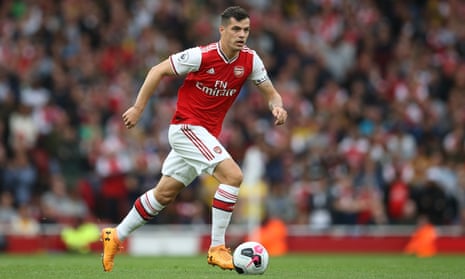If the central tenets of a captain’s role are to inspire and unite, it was not an especially good look when Granit Xhaka was substituted with 18 minutes left of last Sunday’s win against Aston Villa. Arsenal seemed to be fighting a losing battle at that stage but the best way to carry the fight, Unai Emery decided, was to let the 20-year-old legs of Joe Willock tear into the visitors. The stand-in captain’s race was run and, as Xhaka departed the scene, the barbs and boos thrown from around the Emirates were loud enough to persuade anyone that the supporters’ distaste was not confined to a single afternoon’s work.
But Xhaka will continue to captain Arsenal at Manchester United on Monday and, as long as he is in the starting XI, in every other game this season. He was selected in an open vote among his teammates and in reality nobody, inside or outside the dressing room, had expected a different outcome. When Emery was asked whether Xhaka had been surprised at his new status he looked confused himself and said: “I don’t know why he’d be shocked.” It would have been a far greater surprise if somebody else’s name had been pulled out and Xhaka’s task now is to block out the external noise and restore some of the gravitas to a position whose muddled recent history reflects that of the club as a whole to some degree.
Xhaka is the ninth permanent captain since Patrick Vieira’s departure in 2005. To put that into context, only the Frenchman and Tony Adams had occupied the role in the previous 17 years. Thierry Henry took over for two seasons but subsequent appointments mirrored Wenger’s attempts to carve a new path through the post-Highbury era and the results were not always pretty.
In August 2007, the squad were so convinced Gilberto Silva had been handed the role that at least one of them congratulated him in person before being told, slightly awkwardly, that they were labouring under a misapprehension. In fact the reliably chaotic William Gallas was then appointed and Jens Lehmann later wrote that Arsenal’s players “shook their heads” when they heard the news. It was little surprise when Gallas was stood down 15 months later but the identity of his replacement, a 21-year-old Cesc Fàbregas, raised eyebrows for other reasons.
Most of Fàbregas’s time as captain was spent amid the increasingly strong pull of Barcelona and, towards the end, his behaviour was not always the most statesmanlike. Robin van Persie was a universally popular successor but jumped ship for Manchester United after a year; Thomas Vermaelen, Mikel Arteta, Per Mertesacker and Laurent Koscielny were all steadier hands and good influences but the latter three were all in the winters of their careers and hardly long-term choices to cajole a changing squad into the future.
Can Xhaka be that? He has time on his side. Friday’s announcement coincided with his 27th birthday and it is sometimes forgotten that he was just 22 when he first captained Borussia Mönchengladbach, his previous club. The notion that he can act as the Arsenal squad’s totem was not exactly plucked from thin air by Emery, who has had more than a year to observe how the midfielder carries himself. Stories of his popularity around the training ground are no confection designed to bolster his image: his voice carries considerable weight and that, as much as anything that happens on the pitch, is an important part of the job.
Emery’s selection of four deputy captains should work to insulate any concerns about Xhaka’s form and the head coach reiterated that his performances will be the only criteria for his selection. The worries on that front are valid but there have been reasons for encouragement too.
While his clumsy penalty concession against Tottenham this month was hardly the act of a wise head, it was more a return to the bad old days than a continuation of the norm. Xhaka missed four games through suspension in each of his first two seasons but only one in 2018-19; he is not quite the rash firebrand who took time to adapt to the speed of the Premier League. The more relevant question now, as evidenced against Villa, is whether he is capable of moving the ball quickly enough for a side that appear to be developing a style based on quick transitions.
In some ways none of this should matter. Few other top sides have seen their captaincy choices pored over quite as intently in recent years, but then Arsenal’s dearth of natural leaders has steadily developed into a source of morbid fascination. Xhaka, who famously spoke upon his arrival in 2016 of the way his parents would hand the house keys to him rather than his elder brother, has prised open the door to a position his personality is tailor-made for, but the battle to win over the wider public starts on Monday.

Comments (…)
Sign in or create your Guardian account to join the discussion